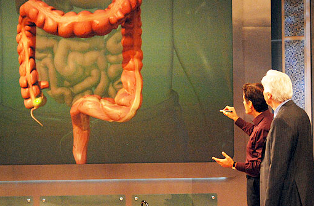September 3rd, 2010 by Jon LaPook, M.D. in Better Health Network, Health Tips, News, Research, True Stories
No Comments »
 Dr. Mehmet Oz just might be the last person on earth people would expect to get a colon polyp. He’s physically fit (he left me in the dust the last time we ran together), he eats a healthy diet, he doesn’t smoke, and he has no family history of colorectal cancer or colon polyps.
Dr. Mehmet Oz just might be the last person on earth people would expect to get a colon polyp. He’s physically fit (he left me in the dust the last time we ran together), he eats a healthy diet, he doesn’t smoke, and he has no family history of colorectal cancer or colon polyps.
But several weeks ago, when Mehmet had his first screening colonoscopy at age 50, I removed a small adenomatous polyp that had the potential to turn into cancer over time. Statistically, most small polyps like his don’t become cancer. But almost all colon cancers begin as benign polyps that gradually become malignant over about 10 to 15 years.
Since there’s no way of knowing which polyps will turn bad, we take them all out. The good news is there’s plenty of opportunity to prevent cancer by removing these polyps while they are still benign. But only about 63 percent of Americans between ages 50 and 75 get screened for colorectal cancer. Read more »
September 3rd, 2010 by Lucy Hornstein, M.D. in Better Health Network, Health Tips, True Stories
No Comments »

 I seem to have had a run on bereavement recently, in that I’ve had several patients who have lost loved ones. Some have wound up in my office for unrelated complaints, only to have the grief spill out. I’ve become aware of the struggles of others via Facebook.
I seem to have had a run on bereavement recently, in that I’ve had several patients who have lost loved ones. Some have wound up in my office for unrelated complaints, only to have the grief spill out. I’ve become aware of the struggles of others via Facebook.
I’ve found this handout (from Family Practice Management several years ago) to be very useful. I keep copies in my office and hand them out when needed, but it occurs to me that having another way to disseminate this helpful information would be a good idea. Read more »
*This blog post was originally published at Musings of a Dinosaur*
September 2nd, 2010 by RyanDuBosar in Better Health Network, Health Policy, News, Research
No Comments »

Patients are pill-splitting more to trim back healthcare costs, according to a poll by Consumer Reports. In the past year, 39 percent took some action to cut costs.
The poll of more than 1,100 people found that 45 percent of people take at least one prescription drug and average four. But 27 percent said they didn’t always comply with a prescription, and 38 percent of those younger than 65 without drug coverage didn’t fill prescriptions at all.
Just over half of patients felt that doctors didn’t consider their ability to pay when prescribing a drug, while nearly half blamed drugmaker’s influence for physicians’ prescribing habits. (HealthLeaders Media)
*This blog post was originally published at ACP Internist*
September 2nd, 2010 by GruntDoc in Better Health Network, Health Policy, Health Tips, News, Opinion, Research
No Comments »

 A mentor recently mentioned in passing that he stopped riding motorcycle when cellphones came out, as he noticed the average driver distraction level had gone way up. He said, “It’s like everybody’s drunk.”
A mentor recently mentioned in passing that he stopped riding motorcycle when cellphones came out, as he noticed the average driver distraction level had gone way up. He said, “It’s like everybody’s drunk.”
There’s lots of ways to be an impaired driver: Physical or mental fatigue, chemicals (legal and not), emotional extremes, etc. (This is not an exhaustive list). What I want to focus on here is a very controllable risk factor: Divided attention.
A quick Internet search turned up some original research from Car and Driver on the subject of texting while driving compared with actual alcohol-impaired driving, and the results are shockingly worse than I would have thought. From their (admittedly limited but well done) study, texting is way worse than being at the legal alcohol limit when it comes to both reading and writing. Read more »
*This blog post was originally published at GruntDoc*
September 2nd, 2010 by Iltifat Husain, M.D. in Better Health Network, Health Policy, News, Opinion
No Comments »

 Bradley Merrill Thompson, an attorney with expertise in the FDA approval process for medical devices, is stating that the FDA is actively monitoring app stores on various platforms. Regulating medical devices and health care-related applications falls under the FDA’s jurisdiction.
Bradley Merrill Thompson, an attorney with expertise in the FDA approval process for medical devices, is stating that the FDA is actively monitoring app stores on various platforms. Regulating medical devices and health care-related applications falls under the FDA’s jurisdiction.
James Kendrick from JkOnTheRun spoke with Thompson, where he stated the following:
The FDA is actively engaged in surveillance of various app stores to see if apps should trigger their involvement. Applications where a smartphone is connected in any way to imaging are under scrutiny, in particular. Any app that is used to transmit images to a medical facility requires FDA approval.
By “various app stores,” Thompson is likely referring to the App store [Apple], Palm App Catalog [Web OS], App World [BlackBerry], and the Android Marketplace [Android OS]. Read more »
*This blog post was originally published at iMedicalApps*
 Dr. Mehmet Oz just might be the last person on earth people would expect to get a colon polyp. He’s physically fit (he left me in the dust the last time we ran together), he eats a healthy diet, he doesn’t smoke, and he has no family history of colorectal cancer or colon polyps.
Dr. Mehmet Oz just might be the last person on earth people would expect to get a colon polyp. He’s physically fit (he left me in the dust the last time we ran together), he eats a healthy diet, he doesn’t smoke, and he has no family history of colorectal cancer or colon polyps.


 I seem to have had a run on bereavement recently, in that I’ve had several patients who have lost loved ones. Some have wound up in my office for unrelated complaints, only to have the grief spill out. I’ve become aware of the struggles of others via Facebook.
I seem to have had a run on bereavement recently, in that I’ve had several patients who have lost loved ones. Some have wound up in my office for unrelated complaints, only to have the grief spill out. I’ve become aware of the struggles of others via Facebook.

 A mentor recently mentioned in passing that he stopped riding motorcycle when cellphones came out, as he noticed the average driver distraction level had gone way up. He said, “It’s like everybody’s drunk.”
A mentor recently mentioned in passing that he stopped riding motorcycle when cellphones came out, as he noticed the average driver distraction level had gone way up. He said, “It’s like everybody’s drunk.”









